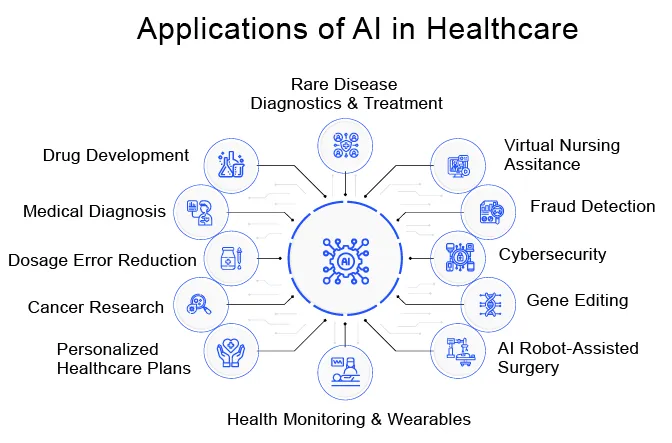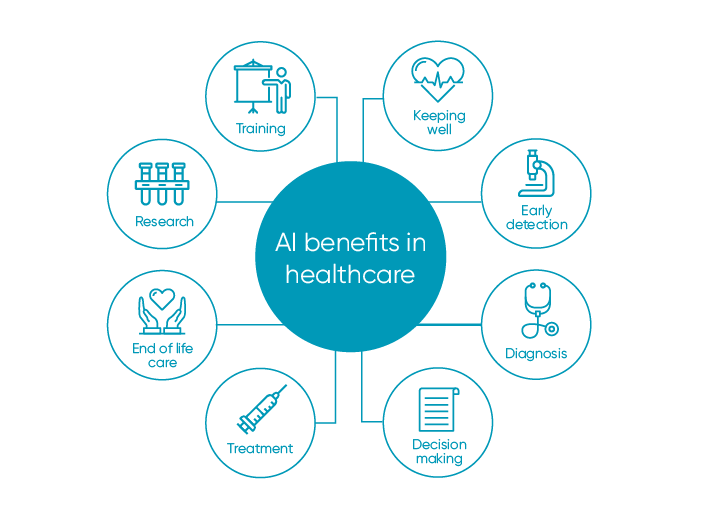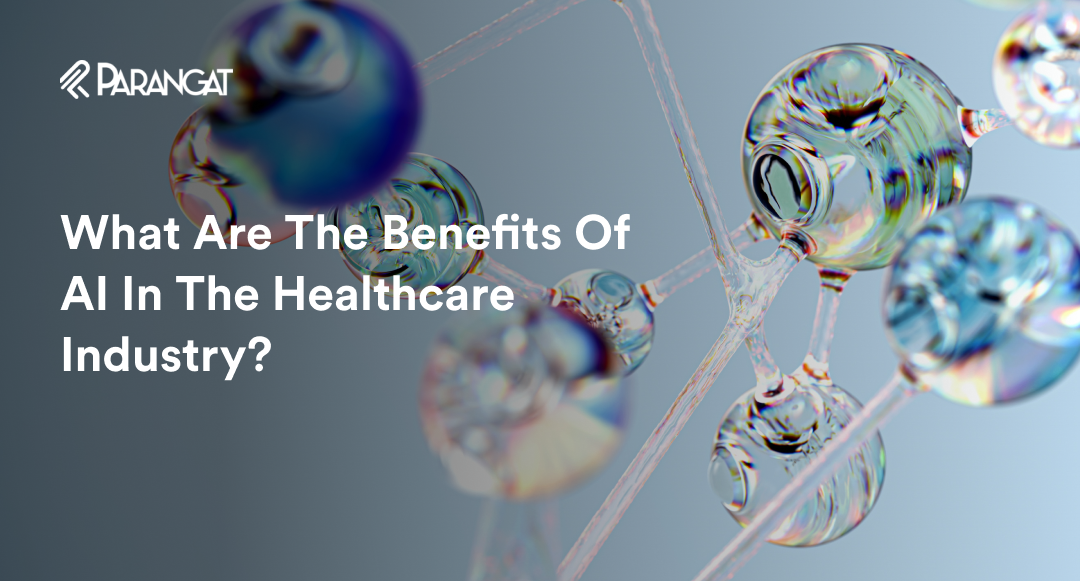Artificial Intelligence is no longer confined to playing your favorite songs upon your command. The days are not far when you might ask, “Alexa, what’s my diagnosis?”It might seem like something out of a science fiction novel, but the truth is, Artificial Intelligence and healthcare are forging a bond that is transforming the way we perceive medical care.
Healthcare providers, in collaboration with AI development companies, have harnessed the power of artificial intelligence to unlock a multitude of advantages. This blog explores the significant benefits that AI has bestowed upon the healthcare sector, paving the way for more efficient, accurate, and patient-centric care.
Let’s delve deeper into what the future holds for AI in this critical healthcare sector and why AI is used in healthcare.
Predicted Market Growth Of Artificial Intelligence And Healthcare
The COVID-19 pandemic has expedited the integration of AI into healthcare like never before. Across the globe, governments and private entities have utilized AI for forecasting infection rates, gauging vaccine efficacy, and determining suitable timelines for easing restrictions.
Let’s look at some intriguing insights from Grand View Research:
- The world of Healthcare IT is on the rise, and how! By 2028, it’s projected to amass a worth of $166.0 billion. The increasing necessity of preventative care and burgeoning investments in many mobile health start-ups fuel this growth.
- Meanwhile, AI’s footprint in diagnostic care is expanding at a swift pace. By 2027, the global market for AI technologies in diagnostics is set to touch $3.0 billion. From 2020 to 2027, it’s slated to soar with a compound annual growth rate (CAGR) of 32.3%.
- As for the broader AI industry, it’s set to burgeon to a staggering $733.7 billion by 2027. From 2020 to 2027, it’s expected to chart an impressive CAGR of 42.2%.
Check this blog: 9 Artificial Intelligence Statistics: All You Need to Know
Artificial Intelligence And Healthcare
Artificial Intelligence (AI) in healthcare is revolutionizing the way we diagnose and treat diseases. It’s not just about algorithms and data; it’s about better outcomes, more efficient processes, and personalized care. AI can analyze vast amounts of data in seconds, enabling early detection of diseases like cancer, predicting patient deterioration, and customizing treatments for individual patients.

An example is Google’s AI program that can detect breast cancer more accurately than doctors by analyzing mammograms. With AI, the healthcare industry can move towards a more proactive model, focusing on prevention rather than cure, thus saving lives and cutting costs. It’s the dawn of a new era in healthcare, with AI at the forefront.
Related: What Is Artificial Intelligence And How Does It Work?
Role Of AI In The Healthcare Industry
We’ve seen the AI potential and the benefits, but why artificial intelligence in healthcare? Simply put, AI can help healthcare providers offer more accurate diagnoses, more personalized treatments, and overall, a more efficient healthcare system. The fusion of artificial intelligence and the healthcare industry is not just a trend; it’s a powerful tool that is set to redefine the way we understand and approach medical care.
Accurate cancer diagnosis:
Artificial Intelligence (AI) plays a pivotal role in early and accurate cancer diagnosis. AI systems are trained to recognize patterns and anomalies in medical images like CT scans, mammograms, and MRIs. This ability leads to a higher detection rate, catching even the most subtle signs the human eye might miss.
Impact on Business:
Accurate cancer diagnosis significantly reduces the cost of false positives and unnecessary treatments. It also helps healthcare providers deliver better patient care, improving their reputation and patient trust.
Benefits:
- Improved patient outcomes through early detection
- Reduction in misdiagnosis or late diagnosis
- More efficient use of healthcare resources
- Potential reduction in healthcare costs
Customer service chatbots:
Chatbots in healthcare act as the first point of contact for patients. They provide immediate responses to inquiries, schedule appointments, and even offer essential health advice, freeing healthcare professionals to focus on more complex tasks.
Impact on Business:
Chatbots significantly improve the efficiency of healthcare services. By handling routine tasks, they reduce the workload on staff, increasing productivity. Their 24/7 availability also improves patient satisfaction by ensuring immediate assistance at any time.
Benefits include:
- Improved patient engagement by offering immediate responses
- Increased staff productivity by handling routine tasks
- Cost savings due to automation of administrative tasks
- Enhanced data collection, providing insights for better patient care and services.
Remember, while chatbots can greatly enhance efficiency, they should complement, not replace, the human touch that is essential in healthcare.
Virtual health assistants:
Virtual health assistants provide personalized healthcare reminders and monitor patients’ wellness between visits. This includes reminders for taking medication, tracking daily physical activity, and even offering diet suggestions.
Impact on Business:
Virtual health assistants allow healthcare providers to offer continuous, personalized care. This proactive approach can improve health outcomes and increase patient satisfaction.
Benefits include:
- More efficient patient monitoring
- Better adherence to treatment plans
- Reduction in hospital readmissions
- Improved patient autonomy and health literacy.
Treatment of rare diseases:
AI can help identify and treat rare diseases by analyzing vast amounts of medical data and literature, finding patterns humans might overlook.
Impact on Business:
By improving the diagnosis and treatment of rare diseases, AI can help healthcare providers deliver more comprehensive care, increasing their reputation and patient trust.
Benefits include:
- Improved patient outcomes through early diagnosis
- More effective treatment plans
- Increased knowledge about rare diseases, aiding future research and treatment.
Management of medical records:
AI can streamline handling vast amounts of patient data, making it faster and easier to retrieve and update medical records. This improves data accuracy and allows for better-informed clinical decisions.
Impact on Business:
Better management of medical records can improve efficiency, reduce errors, and support personalized care, enhancing patient satisfaction and trust in the healthcare provider.
Benefits include:
- Faster, more accurate access to patient data
- Improved decision making
- Reduction in administrative tasks, freeing staff for patient-focused work.
Reduction of dosage errors:
AI can prevent medication errors by cross-checking patient data and prescriptions, ensuring the correct dosage and medication type. This is particularly useful in high-stress environments like ICUs.
Impact on Business:
By reducing medication errors, healthcare providers can enhance patient safety, satisfaction, and trust, potentially reducing liability cases.
Benefits include:
- Increased patient safety
- Improved medication adherence
- Reduced healthcare costs associated with medication errors.
Robot-assisted surgery:
AI enables surgeons to perform complex surgeries with greater precision, flexibility, and control than conventional techniques.
Impact on Business:
Using AI in surgical procedures can significantly enhance a healthcare provider’s reputation for innovative, high-quality care.
Benefits include:
- Increased surgical precision, reducing risks
- Shorter hospital stays due to less invasive procedures
- Improved patient outcomes.
Development of new medicines:
AI can expedite the development of new drugs by predicting their effectiveness and potential side effects before clinical trials, saving time and resources.
Impact on Business:
Faster drug development can lead to a competitive advantage, especially for pharmaceutical companies and research institutions.
Benefits include:
- Reduced time and costs of drug development
- Increased success rates in drug trials
- More effective treatment options for patients.
Valuable assistance to emergency medical staff:
AI can support emergency medical staff by providing instant access to critical patient information, predicting the severity of the patient’s condition, and suggesting treatment protocols.
Impact on Business:
AI-enhanced emergency response can improve patient outcomes and satisfaction, enhancing the reputation of healthcare providers.
Benefits include:
- Faster, more accurate diagnoses
- Improved treatment protocols
- Increased survival rates in emergency situations.
Easy information sharing:
AI can facilitate the sharing of patient information between different healthcare providers, ensuring a comprehensive view of a patient’s health and facilitating coordinated care.
Impact on Business:
Effective information sharing can improve patient outcomes and satisfaction and foster stronger relationships with other healthcare providers.
Benefits include:
- Improved coordination of care
- More informed clinical decisions
- Better management of chronic conditions.
What Is The Future Scope Of AI In Healthcare?
Looking to the future, the possibilities for AI in healthcare are exciting and virtually limitless. Here’s a look at the anticipated advancements:
Unleashing the power of automation
Wherever there’s manual work, there’s an opportunity for AI to step in. Automating processes can drive down costs, boost accuracy, and redeploy our valuable human resources where they’re most needed. This enhances efficiency and allows healthcare workers to focus on areas where their expertise is indispensable.
Creating hybrid models
The future of AI in healthcare isn’t just about standalone technology but rather the synergy created when different technologies work together. For instance, the effectiveness of the Internet of Things (IoT) could be amplified when integrated with deep learning and context awareness. Similarly, Natural Language Processing (NLP) is already utilized in chatbots and virtual health assistants, but its potential can be fully realized when combined with other technologies.
Augmenting disease management
Currently, disease management is a sector ripe for innovation. Once healthcare professionals grow comfortable with the capabilities of AI, we could witness a significant transformation in how diseases are managed and treated.
Revolutionizing drug discovery and trials
The AI-fueled future could simplify drug trials by automatically identifying and evaluating suitable candidates based on specific indicators. AI can also help discover new medicinal applications, assess potential side effects, and build platforms to repurpose existing drugs and molecules.
Learn: Unlocking the Power of Generative AI: A Complete Guide
Top benefits of using AI in Healthcare
Embracing AI in healthcare brings many benefits that revolutionize how we approach healthcare. Here’s a breakdown of the top advantages that illustrate how artificial intelligence is transforming the healthcare industry:

Automating tasks
Through AI, the mundane and repetitive tasks of treatment management can be handed over to sophisticated algorithms. This not only saves time but also ensures continuous improvement in task handling.
Harnessing patient data
AI, especially deep learning, thrives on large data sets. Larger hospitals managing vast patient records can utilize this data to enhance decision-making processes and improve patient outcomes.
Predictive analysis
We can analyze existing data to predict future health outcomes by implementing advanced machine learning systems. This aids in proactive healthcare management and more personalized treatment plans.
Encouraging self-monitoring
AI-fueled wearable tech allows patients to monitor their health. This reduces the workload on healthcare professionals and ensures they have access to real-time data, leading to better, personalized treatment.
Enhancing accessibility
AI helps to bridge the gap between healthcare professionals and those hesitant or unable to seek medical help. With smartphone-integrated healthcare solutions, quality care becomes accessible to everyone, no matter their location.
Speeding up processes & cutting costs
Virtual health assistants offer medical advice without the cost and time associated with visiting a doctor’s office. Moreover, AI-backed treatments can dramatically reduce time-critical procedures, making healthcare more efficient and cost-effective.
Steering Towards An AI-Empowered Healthcare Future
As AI continues to evolve, its impact on the healthcare industry becomes increasingly evident. Leveraging the power of AI, healthcare providers can offer more accurate diagnoses, personalized treatment plans, and preventive care. Administrative tasks are streamlined, drug development is expedited, and remote monitoring is made more accessible. To harness these benefits effectively, partnering with an Enterprise AI Development Company or an AI development company can be a strategic choice for healthcare organizations looking to embrace AI’s full potential in improving patient outcomes and operational efficiency.
The merging of AI with other technologies will create a synergistic force that will transform disease management, medical trials, and drug discovery. The healthcare journey with AI has just begun, and the path is ripe with innovation, efficiency, and an enhanced focus on patient care. As we step into the future, artificial intelligence in healthcare stands as a beacon of hope, promising improved health outcomes and a transformed approach to medical care.
Ready to be part of the AI-driven future of healthcare? At Parangat Technologies, we’re at the forefront of delivering advanced AI solutions that are transforming the health sector. Whether you’re looking for comprehensive AI solutions, we can help you lead the way in this exciting new era. Get in touch with us today, and let’s shape a healthier future together.

With roll up sleeves, dive in and get the job done approach, it was in the year 2010 when Sahil started Parangat Technologies. Emphasizing a healthy work culture and technology-driven company, he has successfully created a workplace where people love to work and live. He is a software engineer and a passionate blockchain enthusiast.


 +44-7511-112566
+44-7511-112566 +353-1-8079571
+353-1-8079571 +1-415-799-9792
+1-415-799-9792

